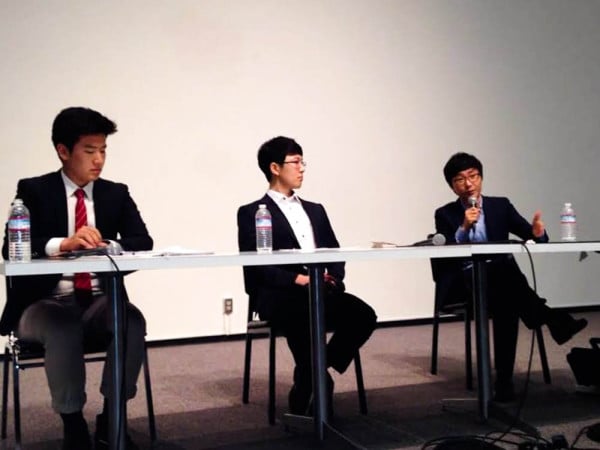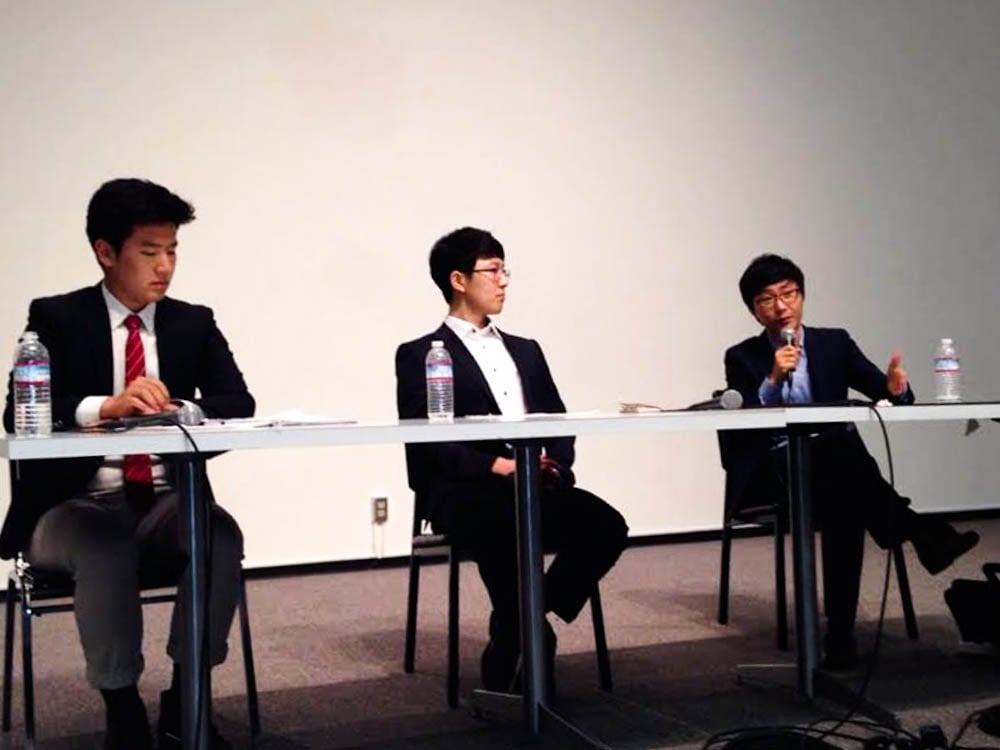
Two North Korean defectors, Sungju Lee and Seongmin Lee, spoke about their childhood experiences as citizens of the Democratic People’s Republic of Korea (DPRK) as part of a panel sponsored by the Korean Students’ Association last Friday.
The panel was organized by Joon Kee Park ‘17, who crossed paths with both panelists while working with a human rights organization in Seoul.
At first blush, the two defectors have much in common: Both were born in North Korea, both crossed the Korean-Chinese border to freedom as young adults and both are presently pursuing undergraduate degrees in Seoul. Yet they followed very different trajectories to their present lives in South Korea.
Sungju and his family’s standard of living departed noticeably from the narrative most tell about North Korea — his father was an official in Kim Il-Sung’s personal military guard, and Sungju lived with his family in relative affluence in Pyongyang, the North Korean capital, owning a luxurious house and an imported car.
“While in Pyongyang, I thought North Korea was wonderful,” Sungju said. “It was the best country in the world.”
However, the events that followed Sungju’s early childhood would radically alter both his lifestyle and his perspective on his home country.
When Sungju was 10, in 1994, Kim Jung Il dismissed his predecessor’s military guard and Sungju’s family, impoverished as a result, moved to the countryside in the north. There, they foraged for food in the foothills of nearby mountains, surviving on pine tree bark and snakes. (“Good for protein!” Sungju said, laughing.)
When food grew so scarce that survival seemed unlikely, his parents, driven to desperation, left home to search for food in China. Left alone and without any source of food, Sungju took to the streets. He joined a group of seven teenage boys to beg for and steal food from local merchants.
“We became like little gangsters,” Sungju said. “Stealing became my job.”
In an incredible turn of events, soon after Sungju turned 16, he encountered his maternal grandfather at a train station — an occurrence that he now calls a miracle. After moving with his grandfather to his family farm, an agent hired by his father, who had by then escaped to China, arrived at his grandfather’s farm to deliver Sungju across the border to China.
Sungju only found out afterward that such an operation required approximately $20,000 in bribes from his father. On Friday, Sungju described the reunion with his father as the most emotional experience of his life.
For Sungju, much about leaving North Korea has been an adjustment — the language was different, and initially, even considering that North Korea was not the greatest country on Earth was a perplexing prospect.
He closed by describing his dream for the future of the Koreas to the audience.
“I hope to be there to unite North and South Korea someday,” Sungju said.
In contrast, the younger panelist, Seongmin, experienced a vastly different journey to China. While Sungju’s departure from DPRK was sudden and drastic, Seongmin left the nation gradually, escaping from and returning to his home country several times since the age of 13.
Seongmin described an image that crystallized the distinction he observed between the two countries on either side of the border.
At night, China was brightly lit, illuminated by the electricity that country’s government provided to its citizens, while North Korea was pitch dark, he said.
This was the first sense Seongmin had of the opportunity that lay across the border, and it was then, at the age of 13, that he began his smuggling business, beginning with his very first smuggled good — a puppy, bought in North Korea and sold for a higher price in China.
Over the next few years, Seongmin lived what he described as a life full of “adventure,” and he irreverently persisted in his smuggling operation despite raids of his home, warnings from law enforcement officers and stints in prison.
Eventually, he was able to accumulate enough money to bribe his way across the border in much the same way as Sungju’s father had paid. Seongmin recounted paying off border agents, airport workers and police officers to make his way safely to China, and then eventually South Korea.
Seongmin closed by pleading with the audience to bring awareness about the depth of human rights abuse in North Korea to the international community.
His strong belief is that technology, which is gradually seeping across the border into North Korea, will bring information that will help young North Koreans “distinguish between true and false, and then choose their own way” in aligning with or against the regime of Kim Jung Un.
Contact Shubha Raghvendra at sraghven ‘at’ stanford ‘dot’ edu.
